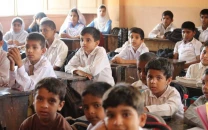Missing children: With a ticket for a runaway train
An average of 3,000 children aged between 5 to16 years go missing in Pakistan every year.

Shaista Shaheen’s son Umer Farooq, 14, was sent for lessons to a madrassa called Jamia Sirajia near their home in Asghar Mal Chowk, Rawalpindi. On August 2, 2010, he did not return home.
“I have no clue whether my son was kidnapped or ran away from home. The day he went missing we did not get any calls for ransom. The only people who called us were those who read about him in newspapers and tried to extort money from us by falsely claiming that they had him,” Shaheen told The Express Tribune.
Before his disappearance, Farooq used to complain about the madrassa’s environment.
“Mama, those people are not good. I am not comfortable with them. Please send me to another madrassa,” he would request.
When asked if they knew anything about Farooq, the madrassa management brushed it off saying that they were responsible only for the children who lived there, not for day scholars.
However, this was not Farooq’s first vanishing act. He had gone missing twice before, but was recovered within a day each time.
“Once he disappeared on August 22, 2007 when we took him to a playground near our home, but was recovered late at night from Haripur. Then he went missing on October 24, 2009, but was recovered from Lahore the same day,” confided Shaheen.
On each return, Farooq would cry for days. According to the scared child, he was picked up by a group of people in a white Suzuki van the first time, who took him to a destination he could not recognise. Throughout the day, they threatened to cut his body parts and forced him to beg or sell his kidneys.
The second time he was taken to Lahore and told to transport a bag full of drugs to a place near Minar-e-Pakistan. Fortunately, he ran after spotting a policeman nearby.
Farah Khan, supervisor at Edhi Homes located in H-8 sector of Islamabad, told the Express Tribune that they received ten runaway children in 2010, the majority of whom were girls.
“They were dropped here either by the police or by the passersby who found them on the roadside,” she explained.
Inquiries about why they decided to leave their homes are usually met with complete silence, but that is not always the case.
“I left home because my parents used to beat me brutally on minor issues,” revealed Sumaira Bibi, 12, who came from Rawalpindi to Edhi Homes.
Aqsa, 15, came to Islamabad from Karachi after being subjected to daily beatings at the hands of her uncle who had become her guardian following her parents’ murder.
According to a study conducted in 2010 by Plan International, a non-governmental organisation, an average of 3,000 children aged between 5 to16 years go missing in Pakistan every year. The number may be much higher as many disappearances go unreported.
According to the study, the reasons behind disappearances vary from escaping domestic abuse or poverty to abduction for sale into child labour or sex markets. Most of the reported victims or runaways are boys, while the cases of girls go unreported due to notions of “honour”.
“In Pakistan, no child protection mechanism exists because of which the number of missing children is constantly increasing,” said Safdar Raza, advocacy manager at Plan Pakistan.
Raza stressed the need for strict monitoring of children travelling via public transport facilities.
Shakeel Ahmad, assistant sub-inspector at Aabpara Police Station, said parents often come to the station to lodge the First Information Report (FIR) of their missing children.
“The children who go missing are mainly picked up by gangs for various purposes, such as forced beggary or trafficking,” he added.
According to a police official deputed at the emergency ward of Pakistan Insitute of Medical Sciences, parents often come looking for their children to the department but are fearful of lodging an FIR. One can only wonder why.
Data regarding missing children is not recorded in a proper form at police stations.
Offering a possible reason for Farooq’s disappearance, Qari Muhammad Zuberi of Al-Quran Academy, Rawalpindi, explained that the majority of parents who send their children forcefully to madrasas do so because their children are not very intelligent. Sometimes, the children are left with no option but to run away from their homes.
Published in The Express Tribune, January 13th, 2011.



















COMMENTS
Comments are moderated and generally will be posted if they are on-topic and not abusive.
For more information, please see our Comments FAQ